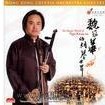Wei Guanhua
Organized by 湛鹰 on 2022-03-10

Wei Guanhua is currently a gaohu and banhu musician of the Hong Kong Chinese Orchestra, and teaches at the Hong Kong Academy for Performing Arts, the Hong Kong Academy of Music, and the Hong Kong Institute of Education.
After the age of nine, he followed the late famous Huqin master Liu Mingyuan to learn various types of huqin such as banhu.
Under the long-term careful study, he has mastered a variety of huqin playing skills, and can accurately and authentically handle and express the musical styles of different places. Its basic playing skills are solid, the timbre is sweet and unrestrained, and it forms a simple, natural, inner delicate, witty and enthusiastic playing style.
In 1982, he won the "Excellent Performance Award" in the National Instrumental Music Competition held for the first time by the Ministry of Culture of China. The China Record Society published its albums "Celebrating Victory" and "Military and Civilian Production". Hong Kong Hugo Records and Nanjing Audio-Visual Publishing House also included Banhu pieces such as "The Crescent Five Watches" and "Brother of the Red Army is Back".
Graduated from the Folk Music Department of China Conservatory of Music in 1985.
In 1986, he was admitted to the Composition Department of Shanghai Conservatory of Music. During this period, he composed many vocal works, which won the silver prize in the China Art Song Competition in the 1980s, and were selected as teaching materials for the vocal music department.
He moved to Hong Kong in 1991 and has been invited by the Hong Kong Chinese Orchestra many times to perform as a soloist in concerts. In 2001, he successfully performed a solo Huqin recital, which was well received.
In 2004, at the "Night of Huqin Masters in China, Hong Kong and Taiwan" concert by the Hong Kong Chinese Orchestra, Wei premiered the Jinghu and Erhu Double Concerto "Symphony Suite for Female Generals of the Yang Family" with his superb interpretation and difficult skills, which received rave reviews.
Similar artist
Ma Guanglu, a musician of falling hus, was born in Gongyi, Henan. At the age of 18, he joined the Cultural and Art Troupe of the Political Department of the Second Field Army. In 1953, he was transferred to the Song and Dance Troupe of the General Political Department of the Chinese People's Liberation Army as a soloist.
read >>
Song Fei, known as the "Queen of Chinese Erhu", was born in Tianjin in 1969. As a top musician who has attracted much attention from the Chinese and foreign music and recording circles, he has become a top performer in Chinese bowstring art due to his artistic status and influence. , and is considered to be a leader in the field of Chinese national instrumental music performing arts.
read >>
Involving musical instruments
Banhu (pinyin: bǎn hú) is a kind of stringed instrument with a history of more than 300 years in China. The timbre is high, firm, and has strong penetrating power. It is the main accompaniment instrument for northern opera and rap.
It is the abbreviation of "Treble Erhu". Its shape, structure, bowing technique, and playing symbols used are the same as those of Erhu, except that the qin barrel (resonance box) is slightly smaller than that of erhu, and part of the qin barrel is usually sandwiched between two legs. play.
Zuihu (Quhu) (pinyin: zhuì hú) is a Chinese rubbing stringed musical instrument. Also known as Quhu and Erxian. Mainly spread in Henan and Shandong, it is the main accompaniment instrument of Henan Quju Opera, Shandong Qinshu and Lu Opera.
Involved portfolio
尘夕 - 151 views
八日蝉 - 243 views
线性代数 - 184 views
阿蘅 - 453 views
Involved news
Organized by 茯苓 on 2022-04-12
Lotus Fall has been passed down for more than a thousand years and has been widely popular in Shanxi, Henan, Shandong and other regions, but as the old artists are getting older, they are facing a crisis of survival. After Wang Jinlong, who started learning art at the age of 14, put this ancient quyi on Douyin, it has attracted the attention of a large number of young people, and he has seen new hope. At the same time, netizens will reward and encourage him when watching the live broadcast, which gives him more motivation to inherit this traditional art.
read >>
Organized by 沈梦溪 on 2022-04-02
He loves string music very much. He is the leader and soul of the Yue Mo troupe in the village. For decades, he has often led the troupe members to perform for the surrounding people. He is Wang Chaoying from Shishichang Village, Zunhuadian Town, High-tech Zone. He has won honors such as municipal village treasures, and he is also an advanced individual at the municipal and provincial levels.
read >>
Organized by 小小瞬 on 2022-03-10
The pendant is composed of a piano rod, a piano shaft, a piano barrel, a piano bow, a piano string, a piano horse and so on.
read >>
Organized by 日记里的汤姆 on 2022-03-10
Chinese rubbing stringed musical instruments. Also known as Quhu and Erxian. Mainly spread in Henan and Shandong, it is the main accompaniment instrument of Henan Quju Opera, Shandong Qinshu and Lu Opera. The predecessor of Zuihu was Xiaosanxian.
read >>
Popular artists
- 01 Zhang Xiuyan
- 02 Chen Tao
- 03 Li Muliang
- 04 Zhu Changyao
- 05 Zhang Gaoxiang
 渝公网安备 50010702504639号
渝公网安备 50010702504639号